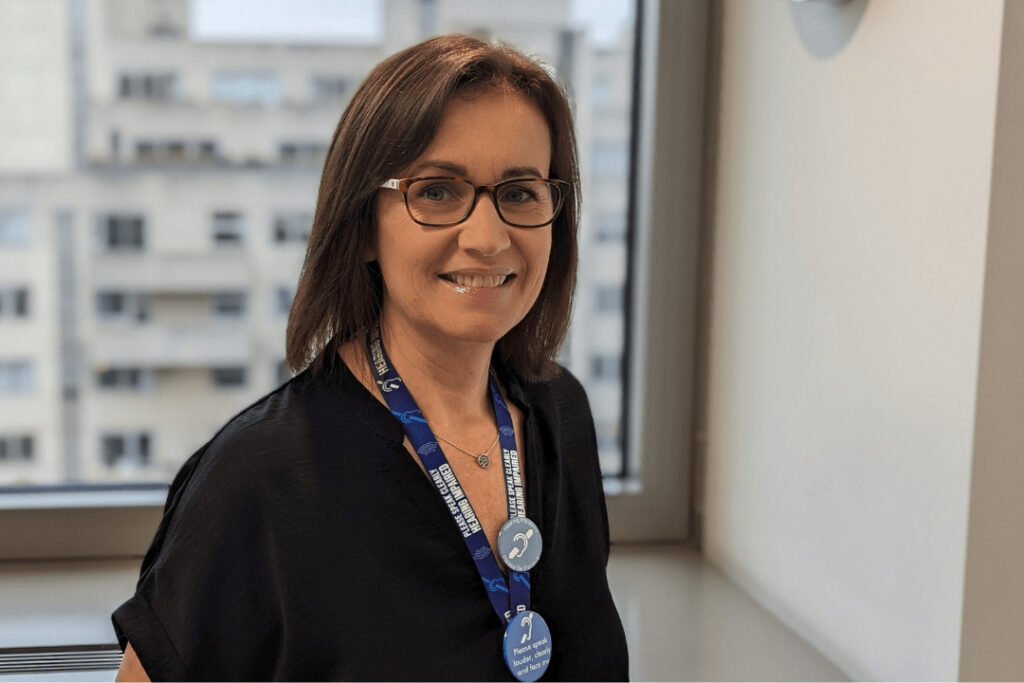Sandra’s hearing deteriorated significantly after the birth of her children. Here, she talks about the challenges she’s faced, and how she tackles those challenges in the workplace and in everyday life.

“I first noticed my hearing loss developing almost 30 years ago. I am now profoundly deaf in both ears. I inherited otosclerosis from my father and grandfather, and I have both sensorineural and conductive hearing loss. This mixed hearing loss means that, for me, sounds are both very soft in volume and difficult to understand.
After the birth of my children, my hearing deteriorated significantly. I got my first NHS hearing aid in 2003. This progressed to me needing two hearing aids about five years later. Without them, I can only hear the loudest of sounds.
A hidden disability
Hearing loss is a hidden disability. In my experience, people either don’t know I have hearing loss (which is understandable), or, once I’ve disclosed it, they subsequently forget because there are no visible cues to remind them.
I’ve developed coping strategies over the years to help me get a sense of the conversation, such as lip reading, closely watching facial expressions, and body language. I’ll make sure my better ear is facing the person who is talking, or when I walk into a meeting I’ll immediately assess where the best place is to sit, so I can see as many faces as possible. If we’re walking and talking at the same, then I’ll try and walk slightly in front of the other person, so I can look back and read their lips.
Hearing loss at work
I’ve been in my current role at work for 10 years. There are numerous challenges to having hearing loss in the workplace. What most people don’t see is the stress and anxiety hearing loss can cause: worrying about missing what someone has asked; not being able to contribute properly to a discussion, for fear of repeating what’s already been said; not hearing if the subject matter has changed direction; even just missing out on jokes and banter, because the back and forth is too fast for me to keep up.
Open plan offices and large meeting rooms have bad acoustics and make it incredibly hard to hear, even if the speaker is sitting right next to you. My worst nightmare is when someone pulls me aside to divulge something private or confidential, and reduce their voice to a whisper so as not to be overheard. They may as well not be speaking at all, for all I will hear. I know many people will be thinking: “just tell them you can’t hear”, but more often than not, I already have – multiple times. It can be awkward, frustrating, and embarrassing.
Disclosing your hearing loss
With the progression of my hearing loss, I’ve had time to adjust and adapt. To help me (and others) I’ve started wearing a lanyard and badge that communicate my hearing loss, so it’s a bit more ‘visible’. I would also advise anyone starting to experience hearing loss to disclose it at work, even if it’s just to your immediate team. It was a relief when I told to mine; it empowered them to help me as much as they could. Of course, the onus should not be on the person with the disability to continually educate others, but being comfortable with guiding people in how they can meet your needs is important.
You may feel embarrassed or uncomfortable disclosing your hearing loss. You may even fear that people will think you are not as capable. But for the most part, I have not found that to be the case. Of course, there have been occasions where individuals have spoken to me differently after learning about my hearing loss, but you can gently and humorously correct them that it’s your hearing affected, not your intellect. It’s important to ask for the support you need from your workplace, whether that’s reasonable adjustments, or understanding what technology is available to support you in your day-to-day role.
Inclusion at work
There’s been a lot of progression towards inclusion over recent years, and my organisation is, for the most part, becoming well advanced in this space. But when it comes to disabilities, even with the most inclusive policies, practices and advancements in technology, it’s often education at an individual level that is needed to drive inclusivity.
Leaders have a hugely important part to play. They can lead by example in being vulnerable, disclosing their own disabilities and role modelling the importance of awareness. I hope that by disclosing my own disability, I will inspire or encourage someone else who may just be starting on that journey of hearing loss to feel it’s possible they can live a normal life, have a good job and progress their career.”
